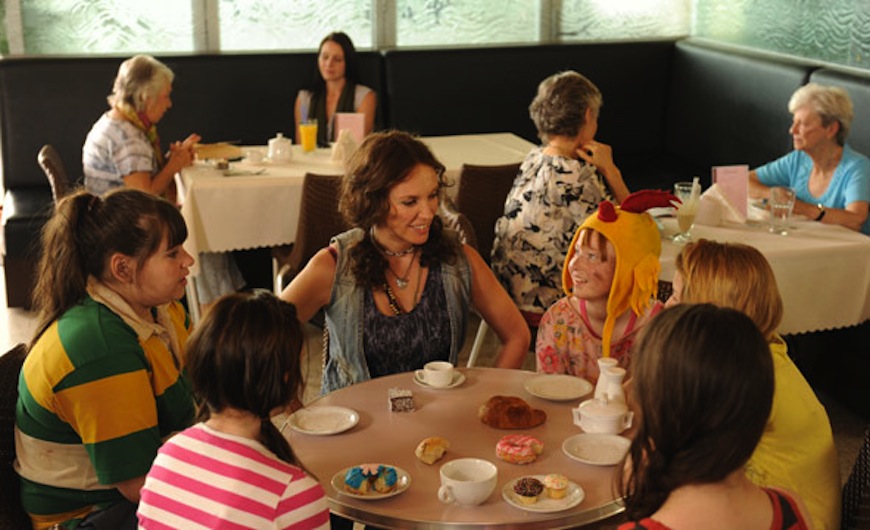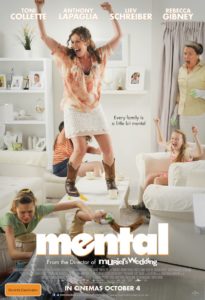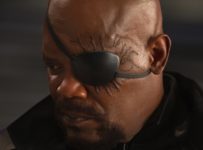Australian cinema gets sent to Wollongong as P.J. Hogan returns to our shores with a semi-autobiographical tale that’s simply nuts.
[stextbox id=”grey” caption=”Mental (2012)” float=”true” align=”right” width=”200″]
Director: P.J. Hogan
Writer: P.J. Hogan
Runtime: 116 minutes
Starring: Toni Collette, Liev Schrieber, Lily Sullivan, Rebecca Gibney, Anthony LaPaglia, Deborah Mailman
Distributor: Universal
Country: Australia
Rating (?): Worth A Look (★★★)
P.J. Hogan first gained mainstream attention with his now iconically Australian Muriel’s Wedding (1994), the film that also put actress Toni Collette on the map. Since then, Hogan has spent most of his time in the US market with rom-com My Best Friend’s Wedding (1997), a big-budget version Peter Pan (2003) and adaptation Confessions of a Shopaholic (2009). Returning to work in Australia for the first time in almost two decades, Hogan draws heavily on his own family history for another slice of suburban life in Queensland. Like the characters in Mental, Hogan’s own family history of mental illness informs his latest venture, and it lives up to its title.
Mental follows the lives of five out of control children emotionally rescued by the outrageous Shaz (Toni Collette) when their mother Shirley (Rebecca Gibney) has a mental breakdown. Their unavailable father Barry (Anthony LaPaglia), a local politician running for re-election tells the children and anybody else who asks that she has gone on holiday to Wollongong. He finds Shaz hitch-hiking and brings her home, where she begins to radically change the lives of the kids. While the eldest daughter Coral (Lily Sullivan) desperately wants her own perceived insanity acknowledged, Shaz teaches them that nobody is ‘normal’.
The film, as the title suggests, is suitably mental. Australian cinema typically has an on/off switch that flips between suburban drama and broad comedy, and very rarely does it push the envelope any further. An unconventional take on The Sound of Music, which serves as a motif throughout the film, it is unlikely that Mental could have been made anywhere else other than Australia. It’s unusual for an Australia film to be so celebratory of the local, and darkly comic about the nature of the Australian suburbia, and this is a refreshing take on local films that feel the need to be somebody else’s view of the Antipodes.
It’s this kind of approach that allows the film to cut loose with the Harold Holt gags, even if it does rely on American import Liev Schrieber for one of the most “Aussie” roles in the film. It does go too far sometimes, and a scene in which a group of girls have a simultaneous collective menstrual emission on a neighbour’s clean couch is glaringly out-of-place. Likewise, as the emotional core of Shaz’s journey comes to a head, Hogan doubts the audience buy-in and doubles back with some more gags that culminate in a fiery coda. Perhaps it’s Hogan’s proximity to the material, which he admits to being “a documentary really”, that prohibits this from being something more than an extended in-joke. The stereotypes that surround the family are more ‘mental’ than anyone in it, but they are also so far removed from reality as to diminish the impact of Shaz’s true impact on the family. When the third act turns to a more serious set of revelations, just as it did with Muriel’s Wedding, we are missing the emotional hook that Hogan already has in his own mind by virtue of having lived some of it.
Much of the attention will be on the return of Toni Collette to Australian screens with the director that put her on the map, but it’s an almost unrecognisable Rebecca Gibney that really shines in this film. She is the natural successor to Muriel’s mother Betty (Jeanie Drynan), a character who was taken for granted by her children and abused by her husband and ultimately commits suicide. While her end is not so tragic in Mental, she is part of the same cycle that is still a sad reality almost two decades on. Newcomer Sullivan is also a real find, bringing a fresh-faced enthusiasm to a familiar role, and actually acting like an adolescent rather than a preconceived notion of one.
Vividly shot, chaotic in nature and making full use of its Queensland backdrop, Mental is not always successful as a comedy or a drama, but it is an entertaining and unabashedly Australian take on a family in crisis. Finding the right tone to laugh with, rather than at, mental illness is a difficult task, and Hogan accomplishes this. Just go with it: it’s more fun that way.
Mental is released in Australia on 4 October 2012 from Universal.





